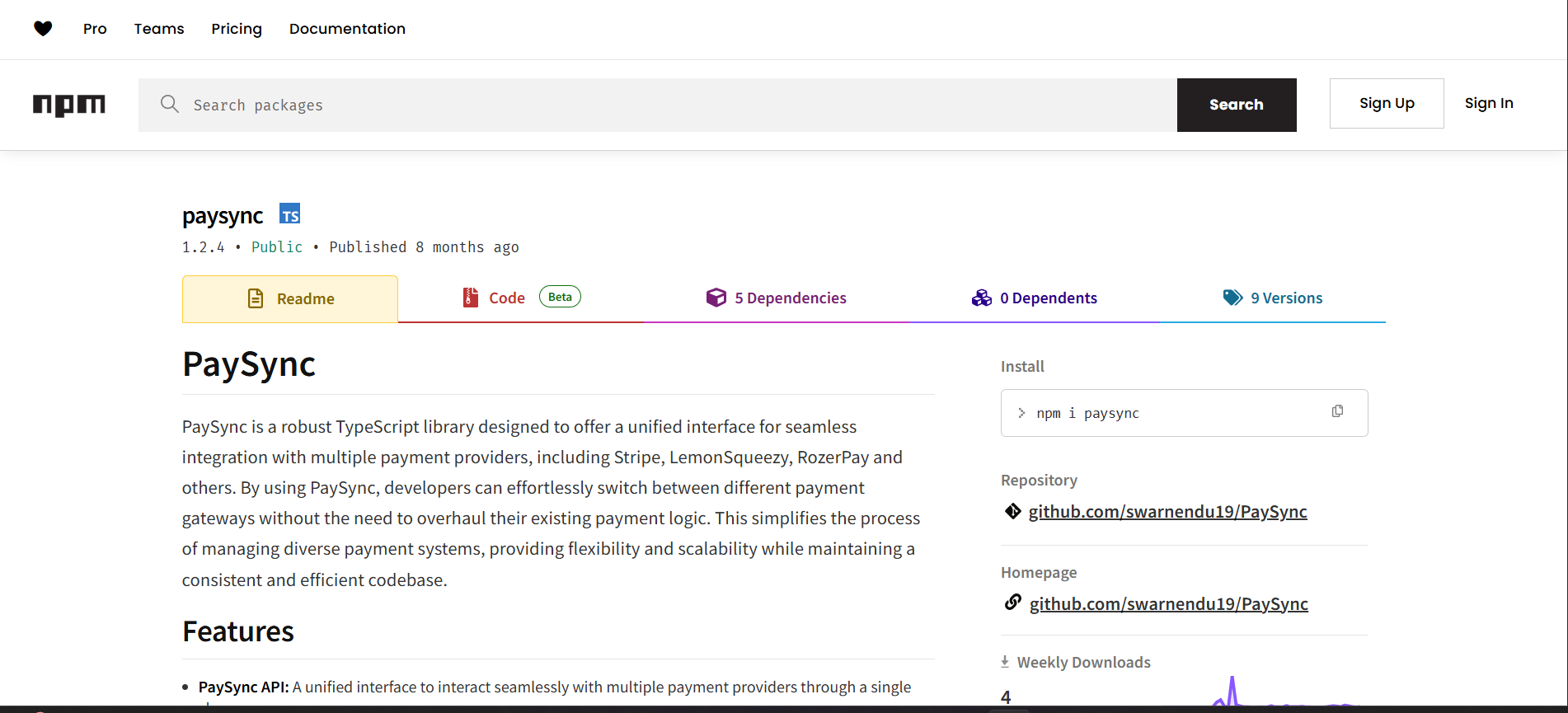Sat Apr 20 2024


Paysync-NPM Package
NodeJS
NPM
Javascript
Stripe
Paypal
Designed a robust API for seamless integration with multiple payment providers like Stripe, RazorPay,Paypal through a single interface.
What is Paysync?

Paysync
PaySync is a powerful NPM package that provides a unified interface for integrating multiple payment providers. It allows developers to seamlessly switch between payment gateways like Stripe, RazorPay, and PayPal with minimal code changes.
Key Features
1. Unified Payment Interface
PaySync offers a consistent API across all supported payment providers. This means you can write code once and easily switch between different payment gateways as needed.
// Initialize with your preferred provider
const paySync = new PaySync({
provider: "stripe",
apiKey: "YOUR_API_KEY",
});
// Same API calls regardless of provider
const payment = await paySync.createPayment({
amount: 1000,
currency: "USD",
description: "Payment for Product XYZ",
});2. Multiple Provider Support
PaySync currently supports integration with:
- Stripe - Industry-leading payment platform
- RazorPay - Popular payment gateway in India
- PayPal - Global payment solution
Each provider is implemented with the same consistent interface, making it easy to switch between them.
3. Easy Provider Switching
Changing payment providers is as simple as updating your configuration:
// Switch from Stripe to RazorPay
const paySync = new PaySync({
provider: "razorpay", // Just change this line
apiKey: "YOUR_RAZORPAY_API_KEY",
});
// Your API calls remain the same
const payment = await paySync.createPayment({
amount: 1000,
currency: "INR",
description: "Payment for Product XYZ",
});4. Comprehensive Documentation
PaySync comes with extensive documentation and examples to help developers get started quickly.
Technical Architecture
PaySync uses a factory pattern to create provider-specific implementations while maintaining a consistent interface:
├── src/
│ ├── providers/
│ │ ├── stripe.js
│ │ ├── razorpay.js
│ │ ├── paypal.js
│ │ ├── paysync.js
│ │ ├── utils/
│ │ │ ├── validator.js
│ │ │ ├── error-handler.js
├── examples/
│ ├── stripe-example.js
│ ├── razorpay-example.js
│ ├── paypal-example.js
Implementation Details
Provider Registration
PaySync allows for dynamic provider registration, making it extensible for future payment gateways:
PaySync.registerProvider("newProvider", NewProviderImplementation);Error Handling
All providers use a standardized error format, making it easier to handle errors consistently:
try {
const payment = await paySync.createPayment({
amount: 1000,
currency: "USD",
});
} catch (error) {
console.log(error.code); // Standardized error code
console.log(error.message); // Human-readable error message
console.log(error.providerSpecificDetails); // Optional provider-specific info
}CI/CD Pipeline
PaySync implements a robust CI/CD pipeline using GitHub Actions:
- Automated testing for each provider implementation
- Integration tests ensuring consistency across providers
- Automated versioning and publishing to NPM registry
- Documentation generation and deployment
Getting Started
# Install via npm
npm install paysync
# Or via yarn
yarn add paysyncBasic Usage
import PaySync from "paysync";
// Initialize with your preferred provider
const paySync = new PaySync({
provider: "stripe",
apiKey: "YOUR_API_KEY",
});
// Create a payment
const createPayment = async () => {
try {
const payment = await paySync.createPayment({
amount: 1000,
currency: "USD",
description: "Order #1234",
customer: {
email: "customer@example.com",
name: "John Doe",
},
});
return payment;
} catch (error) {
console.error("Payment failed:", error);
}
};Future Plans
PaySync is actively being developed with several exciting features on the roadmap:
- Support for more payment providers (Adyen, Square, etc.)
- Subscription management capabilities
- Enhanced fraud detection features
- Webhook management utilities
- TypeScript support and type definitions
Open Source Contribution
PaySync is open source and welcomes contributions from the community. Whether it's adding new providers, improving documentation, or fixing bugs, your contributions are highly appreciated.
Check out our GitHub repository to get involved!